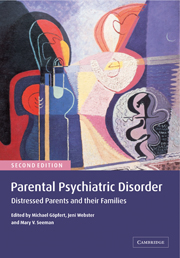Book contents
- Frontmatter
- Contents
- List of contributors
- Foreword
- Preface
- Part I Basic issues
- 1 What we want from adult psychiatrists and their colleagues: ‘Telling it like it is’
- 2 Parenthood and adult mental health
- 3 Parental psychiatric disorder and the developing child
- 4 Parental psychiatric disorder and the attachment relationship
- 5 The construction of parenting and its context
- Part II Comprehensive assessment and treatment
- Part III Specific disorders: the impact on parent–child relationships
- Part IV Specific treatments and service needs
- Part V Child-sensitive therapeutic interventions
- Part VI Models for collaborative services and staff training
- Afterword
- Index
- References
1 - What we want from adult psychiatrists and their colleagues: ‘Telling it like it is’
from Part I - Basic issues
Published online by Cambridge University Press: 09 August 2009
- Frontmatter
- Contents
- List of contributors
- Foreword
- Preface
- Part I Basic issues
- 1 What we want from adult psychiatrists and their colleagues: ‘Telling it like it is’
- 2 Parenthood and adult mental health
- 3 Parental psychiatric disorder and the developing child
- 4 Parental psychiatric disorder and the attachment relationship
- 5 The construction of parenting and its context
- Part II Comprehensive assessment and treatment
- Part III Specific disorders: the impact on parent–child relationships
- Part IV Specific treatments and service needs
- Part V Child-sensitive therapeutic interventions
- Part VI Models for collaborative services and staff training
- Afterword
- Index
- References
Summary
Children and young people want professionals to listen to them, to talk to them and, above all, they want to be recognized as important to the parent they live with.
In November 1999 a small group of young people involved with Barnardos Action with Young Carers (AWYC) were invited to take part in a conference launching the report ‘Keeping the Family in Mind’ (Göpfert et al., 1999; Mahoney, Chapter 23). The project, like other Young Carer projects, provides a service for children and young people who live with someone with a mental health problem, many of whom take on caring roles and responsibilities. All of the young people who participated care for a parent with mental ill health and receive support from staff at the AWYC's project. We know from research and consultations with children and young people that they value being listened to and drawing upon their own experiences (see Cooklin, Chapter 21). They have some very important messages for professionals and policy makers.
Introduce yourself, tell us who you are and what your job is
Young people report that they are often ignored by professionals. They are not given information about what is going on in the family and who and why professionals are visiting. The way in which professionals deliver their service to a family can have a direct effect on other family members.
Have you any idea what it feels like for a complete stranger to come into your home, ignores you and then blames you for your home situation?[…]
- Type
- Chapter
- Information
- Parental Psychiatric DisorderDistressed Parents and their Families, pp. 3 - 7Publisher: Cambridge University PressPrint publication year: 2004
References
- 8
- Cited by

